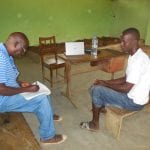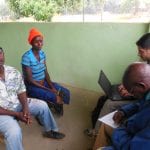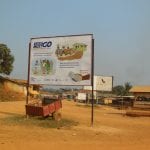April 23, 2015
When the first cases of Ebola in Liberia were reported in Lofa County in March 2014, the DOLF project management team immediately suspended research activities located in the county. No one knew at the time that this would be the worst Ebola outbreak in history. In Liberia the disease infected more than 10,000 people resulting in more than 4,400 deaths. In Lofa County 332 confirmed cases have been reported.
Happily, Liberia now seems to have the epidemic under control. The last confirmed case in Liberia died on March 27, and since then no new cases have been reported. In Lofa County the last case was reported the week of November 9. Given the improved situation, the DOLF management team together with our research collaborators at the Liberian Institute for Biomedical Research (LIBR) made plans to visit our research sites to assess the communities’ willingness and interest in continuing to participate in the DOLF study.

Survey Team: (left to right) Joshua Bogus, Lincoln Gankapala, Kerstin Fischer, Bob Felloe, Jenga Samuka, Jonathan (front)
The team, included Lincoln Gangpala, Kerstin Fischer, and Joshua Bogus accompanied by two translators and community health workers, Bob Felloe and Jenga Samuka. Starting on March 30, the team visited all 32 villages in Foya and Kolahun districts that are enrolled in the DOLF study that is comparing the effect of annual vs. semi-annual mass drug administration (MDA) on lymphatic filariasis, onchocerciasis, schistosomiasis and soil transmitted helminthes. Each village was asked to nominate 3-5 leaders who could speak on behalf of the village to complete a questionnaire regarding their personal knowledge and beliefs about the MDA program and our DOLF study and whether they thought the village was ready to participate again.
After interviewing 140 individuals the team was encouraged to learn that Ebola had not affected directly any of the villages. However, Ebola did have important indirect negative effects on villagers’ access to medical care and public health services. The community leaders also responded that their villages were eager to receive treatment and thought that most people would continue to participate in the research study. Based on these results the LIBR research team has made plans to start MDA at the study sites in late April 2015. The trip highlights the importance of strong community engagement to foster trust between researchers (local and international) and participating communities.


